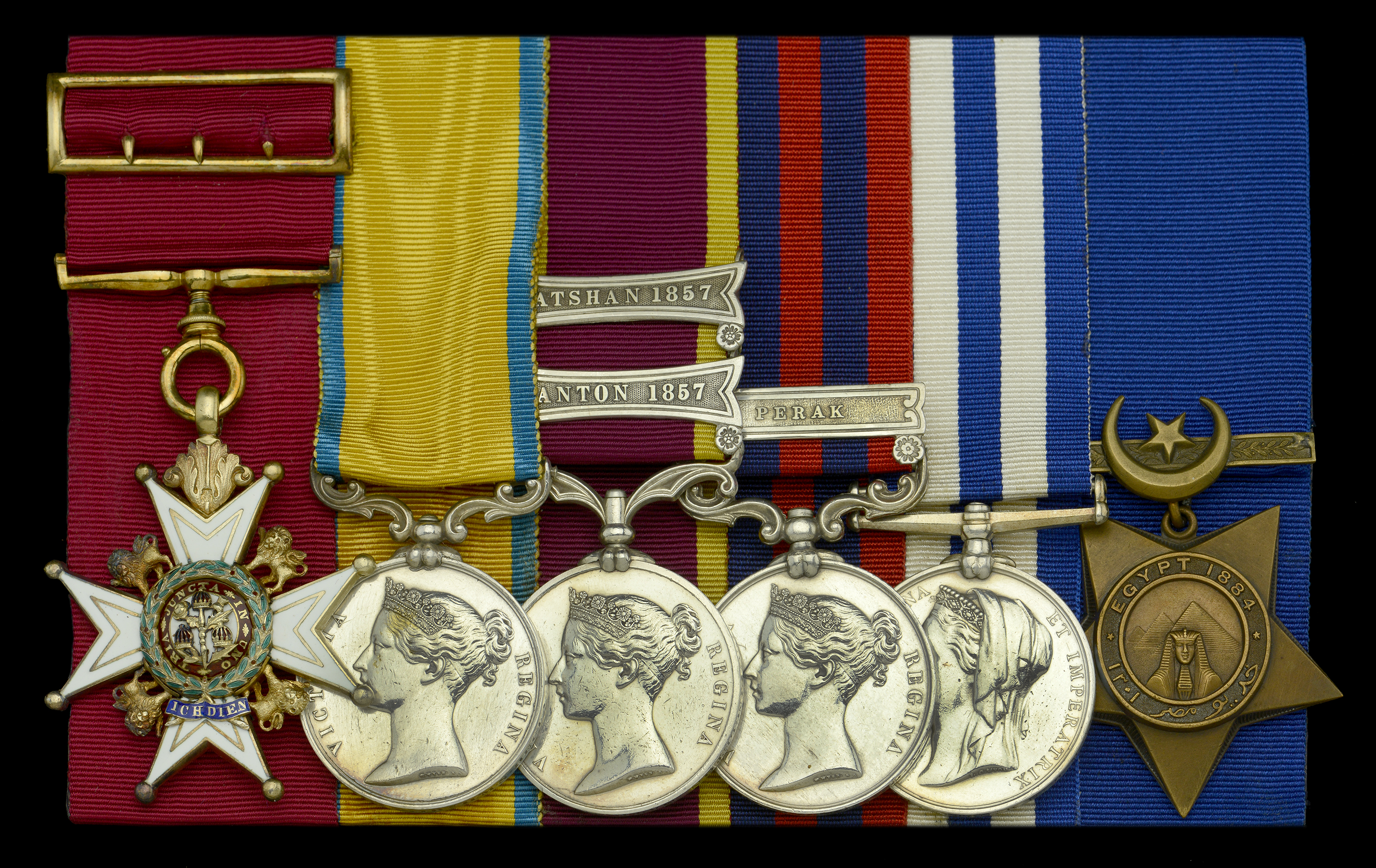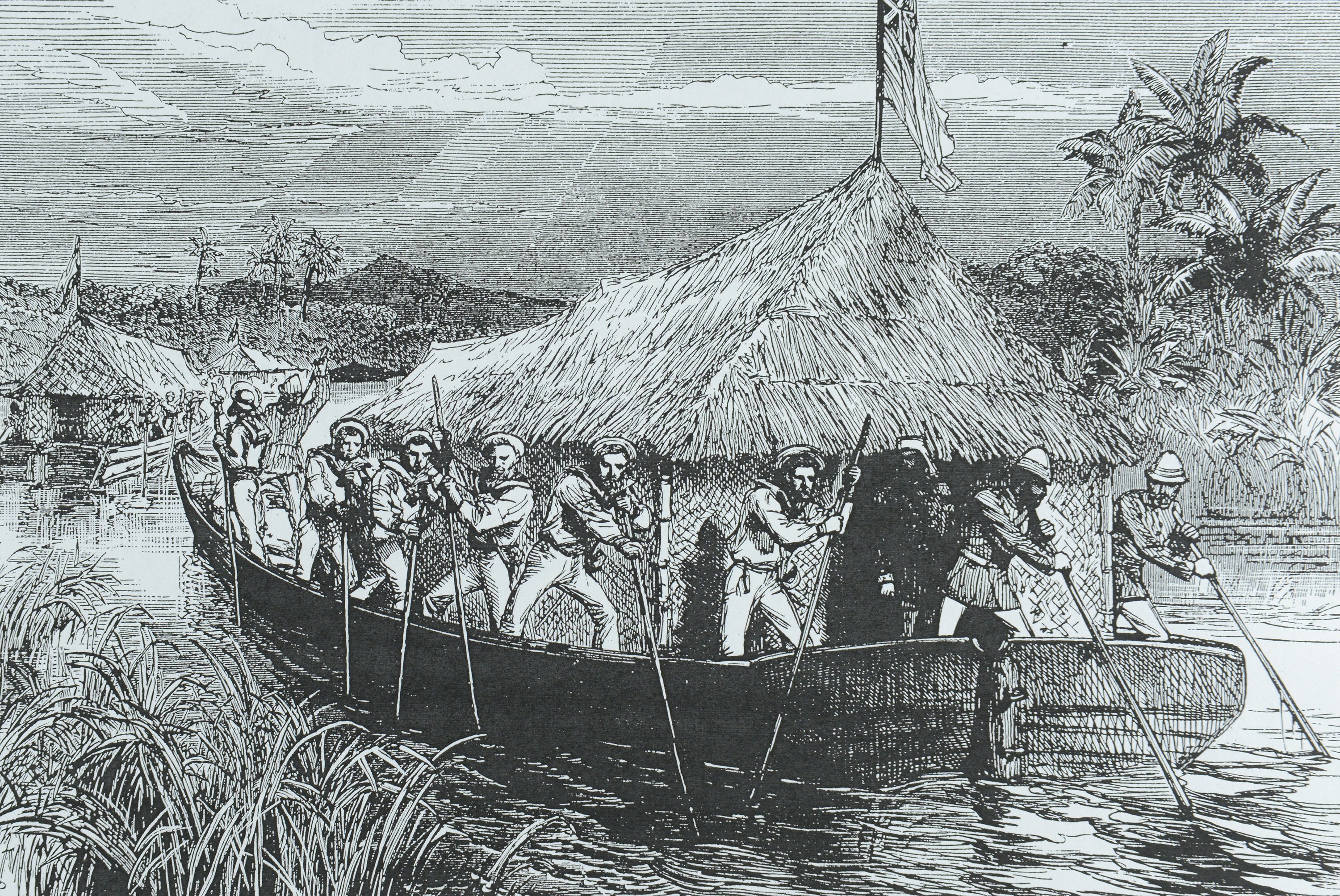The fine Victorian C.B. group of six awarded to Rear-Admiral U. C. Singleton, Royal Navy, whose active service career spanned four decades and four conflicts; he first distinguished himself in the Second China War, in which he was mentioned in despatches and specially promoted to Lieutenant, and added a commendation to his accolades for actions against pirates in Chinese waters in 1866-67 His subsequent services as second-in-command of the Naval Brigade in the Perak Expedition 1875-76 were no less distinguished, gaining him three further mentions and independent command on the Perak River; and he rounded off his active service career with a final mention as Senior Naval Officer at Trinkat in Egypt in the early 1880s C.B. (Military) breast badge, silver-gilt and enamels, hallmarked London 1890, complete with ribbon buckle; Baltic 1854-55 (U. C. Singleton. Midn. H.M.S. Hecla); China 1857-60, 2 clasps, Canton 1857, Fatshan 1857 (U. C. Singleton Mate H.M. Brig “Elk”); India General Service 1854-95, 1 clasp, Perak (Commdr. U. C. Singleton. R.N. H.M.S. “Ringdove”); Egypt & Sudan 1882-89, undated reverse, no clasp (Captn. U. C. Singleton R.N. H.M.S. Jumna.) impressed naming; Khedive’s Star, dated 1884, adhesive deposit to reverse centre of C.B., light contact marks, otherwise very fine and better (6) £5,000-£7,000 --- Importation Duty This lot is subject to importation duty of 5% on the hammer price unless exported outside the UK --- --- Provenance: Alan Hall Collection, June 2000. C.B. London Gazette 24 May 1892. Uvedale Corbet Singleton was born on 14 September 1838 and entered the Royal Navy as a Cadet aboard the training ship Britannia in 1851. As a Midshipman in Hecla during the Baltic operations he was present at the bombardment and taking of Bomarsund in 1854 and, following his transfer to Hastings, at the bombardment of Sveaborg in 1855. Advanced to Mate in September 1857, he next witnessed active service in the Elk in the Second China War, when he was present in her cutter at the boat action at Fatshan Creek in 1857, and was landed for service with the Naval Brigade at the capture of Canton in 1857. For his services at Fatshan in May-June 1857, he was mentioned in despatches (London Gazette 1 August 1857, refers), and specially promoted to Acting Lieutenant in February 1858. Subsequently confirmed in that rank, Singleton enjoyed a spate of seagoing appointments in the 1860s, among them Haughty in 1866-67, when he was commended for his services in several encounters with pirates in Chinese waters. Having then been advanced to Commander in December 1869 and appointed to the command of the Ringdove in January 1874, he was landed as second-in-command of the Naval Brigade in the Perak Expedition in the following year. The Brigade, under the overall command of Captain A. Buller, R.N., was drawn from Ringdove and her consorts Modeste and Thistle, the whole co-operating with Major-General Francis Colborne’s operations on the Perak River. Singleton was subsequently present at the capture of Kinta and afterwards conducted the transport of troops and stores from Durien Sabatong, the highest point on the river navigable by ships, to the front, and later still held independent command on the Perak River. He was thrice mentioned in despatches by Captain Alexander Buller, R.N., Senior Naval Officer, Straits of Malacca, the announcements appearing in the London Gazette on 3 February 1876 and stating: Firstly: ‘Commander Uvedale C. Singleton of Her Majesty’s ship Ringdove rendered great service in his whaler by leading the Flotilla up the river and sounding ahead to discover the passages.’ Secondly: ‘I beg to bring to your favourable consideration the conduct of Commander Singleton of Her Majesty’s ship Ringdove who acted as my Second-in-Command. His services were of great value to me and he carried out my orders with promptitude, displaying great energy and sound judgement.’ And thirdly: ‘I have much pleasure in bringing to your notice the conduct of Commander Singleton of Her Majesty’s ship Ringdove who acted as my Second-in-Command during the Expedition. His services were of the greatest use to me, rendering me much important assistance in carrying out the details connected with the Brigade at all times, encouraging the men when in difficulties with their heavy loads and always to the front when work was to be done.’ It had indeed proved to be an arduous campaign and in his despatch dated 17 January 1876, Vice-Admiral A. P. Ryder, Commander-in-Chief East Indies, paid the following tribute to the fine work of the Naval Brigade: ‘The services of the Naval Brigade has been highly appreciated by Major-General Francis Colborne. The heavy work performed by our seamen on the Perak River consisted of poling (oars were no use), numerous boats heavily laden with guns, ammunition, and stores for many consecutive days against a strong current (4 knots), the river being very shallow, but full of deep holes, under a broiling sun (latitude 3 degrees north), and in carrying guns, rockets, ammunition, in addition to their own accoutrements, through the jungle over roads so nearly impassable that only seven miles could be gained each day. For nearly a month the Naval Brigade under Captain Alexander Buller and Commander Uvedale Singleton had nothing to eat but preserved meat, supplemented occasionally by wild buffalo, no vegetables or bread. The officers and men were constantly wet through by rain; they had frequently to wade through water and mud over their waists. For the last three days of the advance on Kinta they threaded their way through a thick jungle, which during the whole of that time, allowed them no sight of the sky. During the ten days advance they had no cover of anything but slept in the ‘open’. Captain Buller attributes their entire immunity from any disease previous to the attack on Kinta to his having fortunately been able to provide them with waterproof sheets.’ On paying off from Ringdove in April 1877, Singleton spent six months on shore before being appointed to the command of the Durham in November 1877, but he was superseded on his advancement to Captain in March 1878 and placed on half-pay. Not to be outdone, he secured command of Jumna in January 1882 and took part in the operations in Egypt and the Sudan and served as Senior Naval Officer at Trinkitat. He was yet again mentioned in despatches, this time by Rear-Admiral W. Hewitt, V.C., K.C.B., K.C.S.I., Commander-in-Chief, East Indies: ‘My thanks are due to Captain Uvedale C. Singleton of Her Majesty’s ship Jumna for the very efficient manner in which he carried out the duties of Senior Naval Officer at Trinkat.’ (London Gazette 27 March 1884, refers). Singleton’s final command was the Neptune, in which ship he participated in the summer manoeuvres of 1890. Placed on the Retired List at his own request in June 1891, he was awarded the C.B. in May 1892 and advanced to Rear-Admiral in May 1893. Following his retirement, he served as a Justice of the Peace for Co. Meath in Ireland and died in Dublin in February 1910. Sold with copied record of service and other research.









